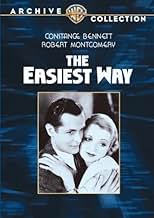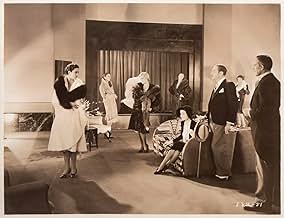Aggiungi una trama nella tua linguaLaura from a poor family rejects her boyfriend for a wealthy older man. She falls for a younger journalist, leaves the wealthy man but struggles financially.Laura from a poor family rejects her boyfriend for a wealthy older man. She falls for a younger journalist, leaves the wealthy man but struggles financially.Laura from a poor family rejects her boyfriend for a wealthy older man. She falls for a younger journalist, leaves the wealthy man but struggles financially.
- Regia
- Sceneggiatura
- Star
- Premi
- 1 vittoria in totale
- Hotel Clerk
- (non citato nei titoli originali)
- Brockton Associate
- (non citato nei titoli originali)
- Women at Cook-Out
- (non citato nei titoli originali)
- Andy Murdock
- (non citato nei titoli originali)
- Chris Swoboda - Laura's Suitor
- (non citato nei titoli originali)
- Bud Williams
- (non citato nei titoli originali)
- Mrs. Clara Williams
- (non citato nei titoli originali)
- Mr. Gensler
- (non citato nei titoli originali)
- Tillie Murdock
- (non citato nei titoli originali)
- Alfred - Brockton's Butler
- (non citato nei titoli originali)
Recensioni in evidenza
Bennett plays Laura, who lives in a crowded tenement with her large family, which includes her father who manages not to work. She gets an opportunity to model for an advertising agency. While there, she catches the eye of the boss (Menjou) who offers her a life of luxury. She takes it. Her mother shuns her, and her brother-in-law, Clark Gable, has no use for her. While she and Menjou are in Colorado, she meets a reporter, Robert Montgomery, and they fall in love. She promises to be faithful to him while he's in South America for three months. But it's pretty hard to make it on her own.
This is an interesting film. Because the actors were getting used to sound, the rhythm is occasionally off, i.e., there are sometimes awkward pauses between lines. Everyone's acting is good, with the exception of Marjorie Rambeau, who has a very melodramatic role and does the tremulous voice thing in her big monologue. Rambeau, however, had been a Broadway star, where her theatrics were more appropriate, and it took actors time to learn the art of film acting. She was a fantastic actress, and I particularly remember her as Joan Crawford's mother in "Torch Song." Constance Bennett, as usual, was very beautiful. She is excellent in the part of a torn, vulnerable woman. Gable is a tough guy sans mustache. He hadn't yet developed his screen persona, but the gorgeous smile was there. Robert Montgomery is wonderful as a young reporter.
There was a neat shot where the camera travels up a building, zeroes in on a window, and then zooms in. It was dizzying and exciting, and it's the kind of detail that makes "The Easiest Way" a good watch. There are real outdoor scenes, too, no painted backdrops, and opulent sets. If they weren't opulent, they were realistic, for instance, the crummy apartment where Laura's family lives.
There was another ending to this film that the Hays office vetoed. Apparently it was shown in some theaters but is no longer available. I'm a sap, so I liked the ending that's in the movie.
Obviously tame by today's standards, it's still not hard to see why The Easiest Way ruffled feathers back in the day. Essentially the plot finds Bennett as Laura Murdock, a poor shop girl who grows so tired of sharing a cramped tenement home with her large family, where three to a bed is the norm, she lands herself a rich older man (Menjou) and becomes a kept mistress. This ostracises her greatly and stuck in a loveless relationship, she's in a bad place emotionally. Hope comes in the form of Jack Madison (Montgomery), and the two hit it off right away and fall in love, but can Laura leave behind the wealth for the sake of love? Just what is the easiest way?
And so it is, running at under 75 minutes, pic gets away with what it can by ensuring the taboo nature of the story centre is cunningly evident. Conway and Mescall show some deft ambition with mobile camera work and nice framing shots out in the exteriors. Performances are all credible, with Gable serving early notice of what was to come in his career, and the ending, one of many filmed as the makers searched for tonal closure, works just fine to linger as a bittersweet aftertaste.
Montgomery isn't in it nearly enough given that he is playing one of the key characters, and the big issue of women striding out for their right to challenge society's stone-age ideals is inadequately unfurled. Other than that this is a thoroughly enjoyable piece of of pre-code classic cinema. 7/10
Then she meets newspaperman Robert Montgomery and wants to give it all up for true love. I won't reveal the ending. But it's not an especially happy one, and three cheers to Hollywood for not selling out.
A few comments on the perfumers: . Robert Montgomery is not someone I can imagine anyone's throwing over even a modest income for.
. Clark Gable has a fairly small role here. He plays, with of course no mustache, Bennett's proper working class and disapproving brother-in-law.
. Bennett is chic as she always is. But she isn't photographed in a faltering manner. Her profile is rather flat. She appears to have an overbite and her false eyelashes seem apparent. Maybe the director of photography and she did not get on well.
. The brilliant Marjorie Rameau turns in the earliest of her fine performances that I have seen. She plays another kept woman. When Bennett is down on her luck and asks for a loan, she sends her packing. But when her daddy dies, she comes to Bennett for money and is given it.
Her performance is in a different realm from that of any of the other players in this movie.
Bennett is a strangely forgotten star of early movies. Rambeau is a sadly underrated actress, whose career spanned several decades.
This is a pre-Code film, but it's a mixed bag relative to moralistic messaging, and that was a little frustrating. Its premise is born out of the Depression, and it being tough for working families to make ends meet. In a common theme from the era, a sudden event promises a change in fortune: the meeting of a rich man. It comes at a cost, however, and "the easiest way" out of one's problems is soon shown to be the hard way.
We initially meet a large family in an early morning scene that was sharp and full of life. Kids of all ages sharing beds are being awakened by their mother and sent on errands or called to get their breakfast. The father announces he is tired of the physical strain of working as a longshoreman and wants to rely on his kids, so he would like his adolescent son to drop out of school so that he can get a job at a construction site catching red-hot rivets thrown by workers in a pail. Yikes. We're not in 2023 here, we're in 1931 - although in light of Iowa and other state legislatures moving forward with loosening child labor laws with little ability to hold businesses accountable in the event of injury or death, hey, perhaps we're also looking at the future here! But I digress. One of his adult daughters (Anita Page) is soon to marry a hard-working blue-collar guy (Clark Gable). The other (Constance Bennett) is a sensible saleswoman, but after being discovered as a modelling prospect, becomes the lover of the top boss (Adolphe Menjou). Her sugar daddy allows her to live a life of luxury and support her family, but the immorality of the relationship (as seen in the eyes of the era) causes her to be ostracized by her mother and brother-in-law, and she's conflicted when she meets someone she truly loves (Robert Montgomery).
It's a fantastic cast with all five of those actors, and these were early roles for Montgomery and Gable, which is a bonus. Director Jack Conway keeps things moving along with great pace as well, and occasionally there are some fine shots, such as the one of Bennett and Montgomery talking at a mountain lake, their backs turned to the camera and the reflection of the trees in the water in the background. We never really see any passion between Bennett and Menjou so it's decidedly tame for a pre-Code film, and that's almost certainly due to censors taking exception to Bennett's life being shown as too alluring before eventually getting to its message and hacking it up at a local level, as Mark Viera describes in Forbidden Hollywood. The film also vacillates melodramatically as it plays out. I liked that part of this showed the position Bennett's character was in, between a rock and a hard place, with her friend saying that the men "held all the trumps," but wish it had taken more of a stand on this hypocrisy.
And that's where most of my discontent came from, the judgment of Bennett's character, while there was absolutely none of this for Menjou's. The most visible form of this comes from Clark Gable's character, who clearly represents the film's moral compass, given the somewhat nauseating forgiveness scene, complete with Christmas trappings, at the end. Even Bennett herself feels she is wrong to be living with a man who is "not the marrying kind," and comes off as more miserable than some of the other strong pre-Code characters and the leading ladies who played them. At least she's not condemned to death so this doesn't feel completely like a post-Code film, but it's close.
Lo sapevi?
- QuizLaura's overdue hotel bill of $62.50 would equate to over $1,200 in 2022.
- BlooperWhile on a trail ride in Colorado, Jack invites Laura to take in his pet view. The view is of Yosemite in California.
- Citazioni
Jack Madison: You know, I may be gone two, maybe three months. What are you going to do? Are you going to be all right?
Laura Murdock: Mmm-hmm. I'll go back to my old job, commercial posing.
Jack Madison: Not one of these artists that, eh...
Laura Murdock: No. Nothing worse than undies, darling.
- Versioni alternativeThe scene where Elfie enters Laura's father's house, (47 minutes), Elfie is played by Marjorie Rambeau and she is wearing a chinchilla trimmed coat. I have two film still photographs showing Marie Prevost as Elfie wearing a fox trimmed coat and a different hat. Laura is wearing exactly the same outfit and the set on which it was filmed is exactly the same.
- ConnessioniAlternate-language version of L'ingannatrice (1932)
- Colonne sonoreThe Sidewalks of New York
(1894) (uncredited)
Music by Charles Lawlor
Played as background music in the opening scene
I più visti
Dettagli
Botteghino
- Budget
- 310.000 USD (previsto)
- Tempo di esecuzione1 ora 13 minuti
- Colore




































